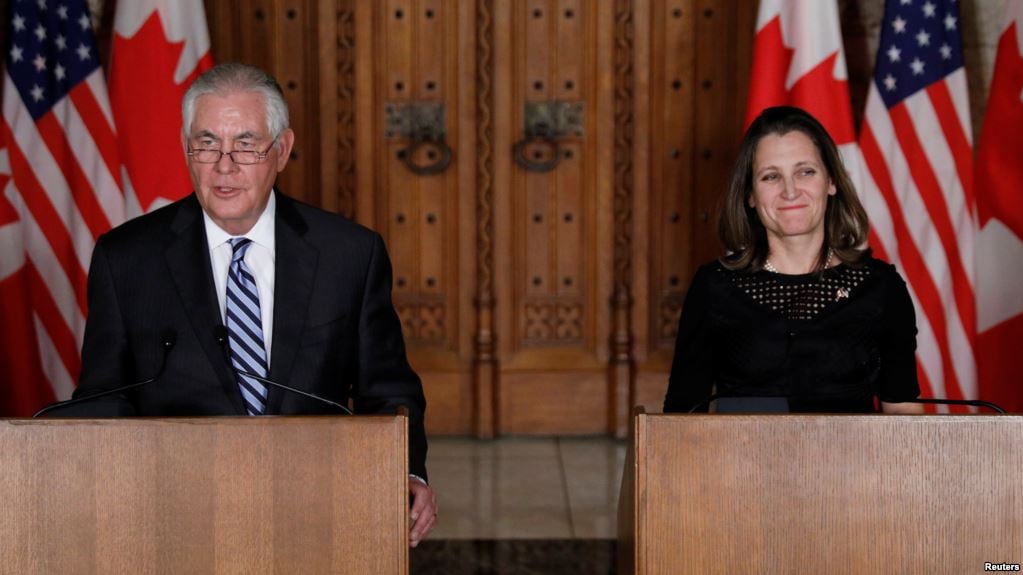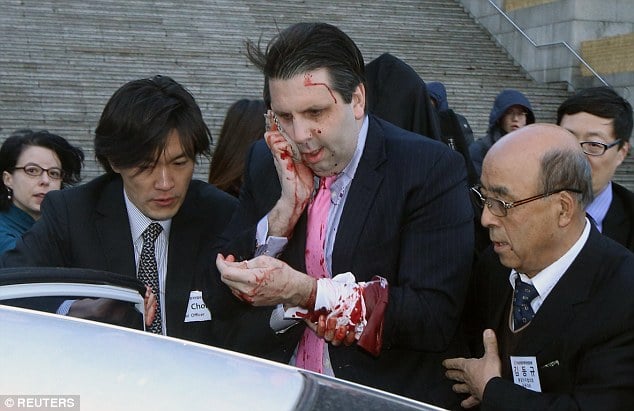
U.S. Secretary of State Rex Tillerson and Canada’s Foreign Minister Chrystia Freeland take part in a news conference on Parliament Hill in Ottawa, Ontario, Dec. 19, 2017. (Reuters)
Canada is expected to bridge international efforts to upgrade the ‘maximum pressure’ campaign against Kim Jung Un ’s deceitful brinkmanship into a more principled pacifying denuclearization discourse. On Jan. 16th, the U.S. and his ‘true north’ brother will co-host a foreign-minister-level meeting for the 16 United Nations command sending states plus South Korea, Japan, India, and Sweden in Vancouver. Most of these UN member-states sacrificed tens of thousands of their young generation’s lives during the Korean War to repel Kim Jong Un’s Grandfather, Kim Il Sung’s aggression and to “restore international peace and security in the area.” South Korea’s Pyeongchang Winter Olympics, due to be held in three weeks, could, if propagandistically manipulated by the Kim regime, incite an unconstrainedly dramatized ultra-nationalist rapprochement sentiment in the Korean peninsula. It is anticipated that the so-dubbed ‘Vancouver Summit’ will set a cornerstone for boxing the compass for North Korea to walk its path to the denuclearization-oriented six-party talks.
Canadian Foreign Affairs Minister Chrystia Freeland, stated, “This is another visible sign that the international community is acting in concert to speak to the government of North Korea and to say this is threatening us all and the pressure will increase until the behavior changes.”
Her comments concurred with U.S. Secretary of State Rex Tillerson statements regarding the role of diplomacy in ending the chronic cycle of the Kim dynasty’s tactical aggravation of tensions in East Asia during the bilateral meeting held in Ottawa on December 19th. Canada, a reputed middle power in international politics, has continuously expressed its overtly critical diplomatic stance against Kim Jong Un’s military provocations since the Harper government established a ‘controlled engagement strategy’ towards North Korea in response to the sinking of South Korean submarine Cheon-an allegedly by a North Korea attack. Recently, as the existential threats posed by the Kim regime’s ICBM portfolio snowballed into an international menace, some of the Canadian mainstream media frequently conveyed its worries that Kim’s ICBM will certainly fly over Canada, arguing in favor of Canada joining the U.S.-led continental missile defense system.
The current political climate seems to be a boon for Canada’s mediating role in chaperoning South Korean President Moon Jae-in to take the ‘driver’s seat’ in reinstating the ‘Sunshine policy’. Kim Jong-un’s New Year messages to use South Korea as a shield to contrive the regime’s survival proved that the internationally concerted sanctions have been finally proven effective. Hence, the role of international society has become ever more critical in validating Kim’s strategically misleading “By Our Nation Itself” discourse. Experts warn that the reinstatement of inter-Korean dialogue might drive a wedge between U.S. and South Korea but what is even more concerning is that such dialogue could elicit belligerent ultranationalists in South Korea to publically rationalize their beliefs in a violent way. Such violence was notoriously demonstrated when the former U.S. ambassador to South Korea, Mark Lippert, was stabbed by an ultranationalist fanatic in 2015. The U.S. virtuously did not problematize the unfortunate incident and the diplomatically serious act of terror has since been gradually forgotten by the South Korean public. Nevertheless, as it is once again predictable that the tawdry political collusion between the Kim regime and the South Korean ultranationalists might safeguard the Kim regime’s “mass production of nuclear warheads and ballistic missiles for operational deployment”, the role of politically neutral international middle powers in eradicating the potential aggressions of Kim Jung-un’s obtainment of complete control over his ICBM and SLBM portfolio became ever more important.

Mark Lippert suffered a deep facial gash and stab wound to his wrist after being attacked by a knife wielding pro-North Korean in Seoul in 2015(Reuters)
Crucial stakeholders like China and Russia decided not to attend the ‘Vancouver Submit’. Chinese Foreign Ministry Spokesperson, Lu Kang, revealed the government’s skepticism towards the effectiveness of the meeting, stating “It will only create divisions within the international community and harm joint efforts to appropriately resolve the Korean peninsula nuclear issue.”
Likewise, Critics point out that the meeting’s opaque agendas and odd participants becloud the prospect of achieving fruitful outcomes. However, as much as it is symbolically important to glorify the two Koreas’ kindred ties in recognizing the Korean people’s aspirations for unification, it is also symbolically important to inter-generationally reconfirm international consolidation against the Kim family’s ultra-nationalism-based manipulative aggression.